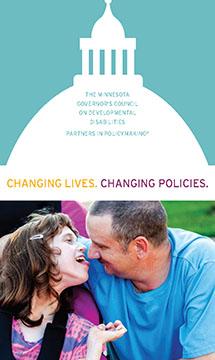The Minnesota Governor's Council on Developmental Disabilities
FORTY-FIVE YEARS OF HISTORY 1971-2016
This article, mainly covering 1987 – 1991, is the fourth of nine segments that will move the history along in five-year sections to bring the Council's work to the present. For context refer to this site's sections "Parallels in Time: A History of Developmental Disabilities" and "With an Eye to the Past" for laws, publications and other documents mentioned in text. In addition refer to the publication "Partners in Policymaking. Changing Lives. Changing Policies.", [https://mn.gov/mnddc/pipm/pdf/PiP-Changing-Lives-Changing-Policies1.pdf.]
PARTNERS IN POLICYMAKING®:
From the time the Governor's Council on Developmental Disabilities was first created in 1971, issues surrounding leadership of the movement were a priority. The Council recognized the need for leadership development programs to train a new generation of advocacy leaders. The Parent, Self Advocacy, and Independent Living Movement advocates of the 1940s-1970s that had been successful in influencing public policy by honing strong leadership and advocacy skills, were aging.
In the closing minutes of a Congressional hearing on Medicaid on September 19, 1986 and after three hours of testimony before panels of experts, the final speaker was a young mother who was given lots of conflicting advice prior to her presentation. Even so, she proceeded and said, "Medicaid is incoherent. The state pays for a person's care in an institution but not at home. It is heartless to force spend downs to poverty level on people with disabilities."
From those few moments, the concept of Partners in Policymaking was born. Preparing people to testify before Congress, and teaching these skills in a safe and supportive environment were all within the realm of possibility.
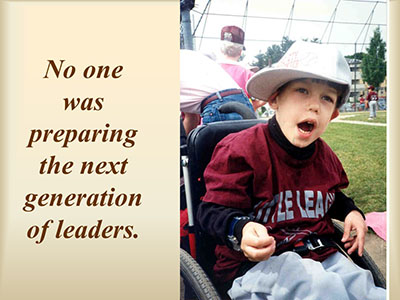
Immediately after that Congressional hearing, the Council began to design a leadership training program. The participants would be self advocates and parents of children with developmental disabilities. They would be provided with the communication skills and leadership tools to influence elected officials and other policymakers in their decision-making regarding changes to existing policies, and legislation and the development of new funding sources and programs.
In the spring of 1987, the Council launched Partners in Policymaking, a competency based and value based leadership training program. The first class of 35 participants – 15 self advocates and 20 parents of young children with developmental disabilities – began a series of eight weekend sessions designed to teach best practices in the field, and the advocacy and leadership skills to work effectively with elected officials to change systems. The basic design of Partners as originally created included the following:
- A series of weekend training opportunities.
- Open to self advocates and parents of young children with developmental disabilities.
- Participants would have no previous experience in the disability rights movement.
- Applicants would be identified and recruited through the existing network of organizations.
- Participants would make strong commitment to the program.
- Mentoring with an elected official would be one aspect of the program.
- Funds would be available to help with childcare, personal assistance and transportation.
- Funding recommendations that included planning initiatives and studies moved the Council closer to deinstitutionalization and public policies prompting the development of programs
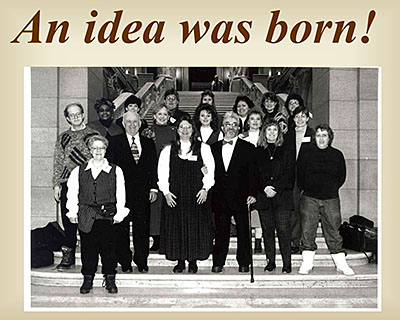
The foundation of the Partners program is based on a set of quality principles, core values about people with disabilities that are interwoven throughout every aspect of the training program, and competencies that participants develop over the weekend sessions. The history of the Partners program, and more than 200 personal stories and testimonials about the impact of the program on Minnesota Partners graduates are included in Changing Lives. Changing Policies published in July 2015 and released on the 25th Anniversary of the Americans with Disabilities Act (ADA).
Through Partners, I learned more about advocacy. My son is 41 years old now and he has gone on to learn advocacy [skills] and has become an advocate for others.
Judy Olson, Parent
Partners taught me how to deal with housing for people with disabilities. I have been able to get out of the group homes and I now live independently with support in the community.
Allie O'Muircheartaigh, Self Advocate
The Partners program is a critical part of the Council's work and has been consistently managed, supported and funded by the Council since its inception. Partners has grown and evolved over the years, and has been replicated nationally and internationally. More than 27,000 self advocates and parents are Partners graduates today.
In 1990 the Council and the World Institute on Disability conducted the first Partners in Policymaking National Academy in California. Due to the spread of the leadership training program, and concerns about protecting the name and preserving the model program, an application for trademark was submitted to the US Patent and Trademark Office in September 1997 and granted in January 1999. Partners is an evidence based leadership training program that has demonstrated its effectiveness in training citizen leaders who could assume public policy advocacy roles, in partnership with their elected officials, as institutions closed and support services were created and increased to promote community integration and inclusion for individuals with developmental disabilities and their families.
Although a significant portion of the work done during the span of history covered by this segment was related to the activities of the Partners program, the Council made other significant accomplishments, helping to maintain and strengthen ongoing programs, and implement new legal and legislative actions.
WELSCH CASE:
On August 25, 1989, after numerous related court actions and appeals, and following the Court's finding that the terms of the Negotiated Settlement Agreement were met and plaintiffs did not oppose defendant's motion to dismiss, the Welsch Case was officially dismissed. The initial results of this fifteen year legal action were the improvement of conditions at the State institutions, and, ultimately, the eventual move of individuals with developmental disabilities to community living situations. In 1987, the last individual with a developmental disability left a state institution.
DEVELOPMENTAL DISABILITIES ACT AMENDMENTS OF 1987 & 1990:
Amendments to the 1963 DD Act refined both the purpose and goals of the Act and the reporting requirements for state Developmental Disabilities Councils.
The 1987 amendments reinforced the importance of planning and coordination of services between service-providing groups; enhancing the role of the family was added to the purpose statement. Councils were to provide both a review and an analysis of eligibility standards as well as consumer satisfaction regarding the services and supports that individuals with developmental disabilities and their families received; and "independence, productivity and integration" were identified as the goals to be achieved.
The 1990 amendments moved the 1987 goals toward, "interdependence, inclusion and recognition of contributions (beyond productivity)." The importance of all community members working to achieve inclusion was recognized. The amendments also mandated interdisciplinary training and technical support for staff professionals, family members and individuals with a developmental disability. This training would enable "advocating for public policy change and community acceptance." Partners in Policymaking was already three years into this leadership training by 1990 with more than 100 graduates "advocating for public policy change."
CASE MANAGEMENT:
The Council continued its work in the case management services provided to families and adults with developmental disabilities. Policy Analysis Series papers were published to show the progress of the Minnesota Case Management Study and summarized some of the outcomes that included training of:
- 44 parents to assist case managers
- 7 persons in the use of personal futures planning
- 19 volunteers to monitor facilities
- 133 peer advocates
- 90 parents and 15 self advocates completed the Partners program
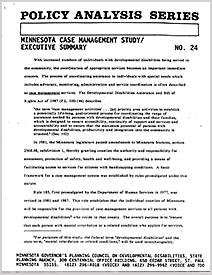
AMERICANS WITH DISABILITIES ACT OF 1990:
In 1990, President George H. W. Bush signed the Americans with Disabilities Act [ADA] into law. This was a celebration of a most significant victory for disability rights and recognition of the leadership of so many members of the disability community who persisted and prevailed to arrive at this historical milestone – extending all civil rights protections to people with disabilities and requiring states to provide services in the "most integrated setting appropriate." The ADA prohibited discrimination in all areas of public life including employment, education, transportation, and all public and private places that are open to the general public; housing (via the Fair Housing Act) and telecommunications (via amendments to the 1934 Communications Act). The ADA ensures that individuals with disabilities have the same rights and opportunities as all persons.
The impact for individuals with developmental disabilities was that the ADA was broad-based legislation that mandated businesses, schools, public facilities, owners of residential housing and others to improve access and provide opportunities to all citizens.
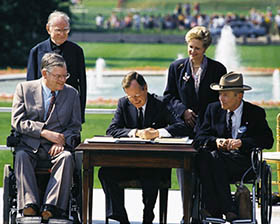
RECAP:
Council programs to support the growing numbers of individuals moving into communities were continuing. The practical issues of housing, life and job skills training, education and technology options for children and adults, non-vocational social development activities, and knowledge of and access to all services were priorities. The Council was also involved in finding ways to expand the use of Medicaid Home and Community-Based Services [HCBS] waiver program funds [part of the Omnibus Reconciliation Act of 1981] to include supported employment, and educational and vocational services.
The advocacy and self-advocacy efforts of the mid-twentieth century brought the issues of the neglect of the human rights of individuals with developmental disabilities to public notice. Over a period of decades, public understanding increased, and legislative and legal actions made great strides toward the ultimate goals of "normalization" and community inclusion for all citizens, including individuals with developmental disabilities. The Council's Partners in Policymaking leadership training program has ensured that the work of the early advocates continues by developing the leadership skills needed to influence positive public policies and insures that people with disabilities continue to be seen for their abilities, not their disabilities.





